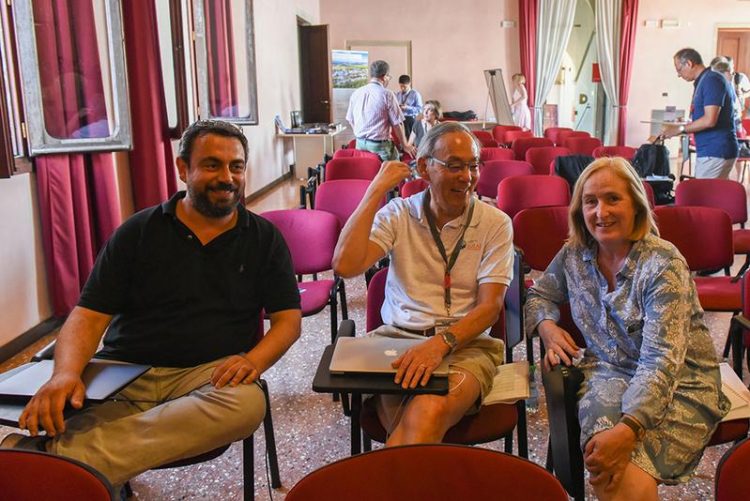Leading experts in Diabetes, Metabolism and Biomedical Engineering discuss Precision Medicine

Prof. Vasilis Ntziachristos, Prof. Steven Chu und Prof. Dame Amanda Fisher. Source: Helmholtz Zentrum München
About 100 internationally renowned scientists discussed most advanced concepts for biomedical discovery and routes towards clinical application. The presentations focused on cutting-edge biomedical imaging, bioinformatics and bioengineering tools to inform future (noninvasive) diagnostics.
The presentation of Nobel laureate Professor Steven Chu on nanoparticle-mediated imaging in biomedicine was a much anticipated highlight. He was honored with the Nobel Prize in Physics in 1997 for his research on the laser cooling of atoms. Steven Chu kindly agreed to serve as member of the scientific advisory board of the HPC.
“With this kick-off event, we have succeeded in building much needed-bridges between scientific disciplines while involving prominent scientists from globally-leading research institutions,” said initiator Prof. Matthias Tschöp and main organizer Dr. Thomas Schwarz-Romond enthusiastically. “The International University of Venice offered an inspiring, academic venue and competent partner for this rather unique event.”
The conference was hosted by Dr. Thomas Schwarz-Romond and his fellow HPC-directors Profs. Matthias Tschöp and Vasilis Ntziachristos. For full impact, they had joined forces with the DZD board members Prof. Martin Hrabě de Angelis, Prof. Hans-Ulrich Häring and Prof. Michael Roden. “We expect a lot of innovative potential and synergies to develop new diagnostic and treatment solutions at the junction of bioengineering and metabolism research,” said Vasilis Ntziachristos.
“The primary drivers are bioinformatic concepts such as big-data analyses, deep learning and artificial intelligence in order to understand biological systems in their entirety and molecular depth,” added Martin Hrabĕ de Angelis.
The aim of the recently founded HPC is to elucidate previously unsolved questions at the interfaces of various research disciplines and to quickly put the latest findings into practice with clinical partners. The 'pioneers' benefit from the internationally recognized expertise and infrastructure of Helmholtz Zentrum München as well as from its close interaction with the DZD. In the DZD, leading German basic researchers, clinicians and epidemiologists are developing new concepts for the successful prevention and treatment of diabetes and want to quickly transfer these into clinical practice.
The first ‘International Conference on Biomedical Breakthroughs’ provided numerous cooperation opportunities for interdisciplinary and patient-oriented research. All organizing partners and the international speakers of renowned research institutions emphasized the immediate added value and thus the special, extraordinarily successful format of this inaugural event.
Further Information
The Helmholtz Zentrum München, the German Research Center for Environmental Health, pursues the goal of developing personalized medical approaches for the prevention and therapy of major common diseases such as diabetes and lung diseases. To achieve this, it investigates the interaction of genetics, environmental factors and lifestyle. The Helmholtz Zentrum München is headquartered in Neuherberg in the north of Munich and has about 2,300 staff members. It is a member of the Helmholtz Association, a community of 18 scientific-technical and medical-biological research centers with a total of about 37,000 staff members. http://www.helmholtz-muenchen.de/en
The German Center for Diabetes Research (DZD) is a national association that brings together experts in the field of diabetes research and combines basic research, translational research, epidemiology and clinical applications. The aim is to develop novel strategies for personalized prevention and treatment of diabetes. Members are Helmholtz Zentrum München – German Research Center for Environmental Health, the German Diabetes Center in Düsseldorf, the German Institute of Human Nutrition in Potsdam-Rehbrücke, the Paul Langerhans Institute Dresden of the Helmholtz Zentrum München at the University Medical Center Carl Gustav Carus of the TU Dresden and the Institute for Diabetes Research and Metabolic Diseases of the Helmholtz Zentrum München at the Eberhard-Karls-University of Tuebingen together with associated partners at the Universities in Heidelberg, Cologne, Leipzig, Lübeck and Munich. http://www.dzd-ev.de/en/index.html
Contact for the media:
Department of Communication, Helmholtz Zentrum München – German Research Center for Environmental Health (GmbH), Ingolstädter Landstr. 1, 85764 Neuherberg, Tel. +49 89 3187 2238, E-mail: presse@helmholtz-muenchen.de
Scientific Contact:
Dr. Thomas Schwarz-Romond, Helmholtz Zentrum München – German Research Center for Environmental Health, Helmholtz Pioneer Campus, Ingolstädter Landstr. 1, 85764 Neuherberg – Tel. +49 89 3187-4133, E-mail: schwarz-romond@helmholtz-muenchen.de
http://Follow this link to the conference website for information about the program and the speakers:: http://sanservolo2018.helmholtz-muenchen.de
Media Contact
All latest news from the category: Event News
Newest articles

First-of-its-kind study uses remote sensing to monitor plastic debris in rivers and lakes
Remote sensing creates a cost-effective solution to monitoring plastic pollution. A first-of-its-kind study from researchers at the University of Minnesota Twin Cities shows how remote sensing can help monitor and…

Laser-based artificial neuron mimics nerve cell functions at lightning speed
With a processing speed a billion times faster than nature, chip-based laser neuron could help advance AI tasks such as pattern recognition and sequence prediction. Researchers have developed a laser-based…

Optimising the processing of plastic waste
Just one look in the yellow bin reveals a colourful jumble of different types of plastic. However, the purer and more uniform plastic waste is, the easier it is to…



